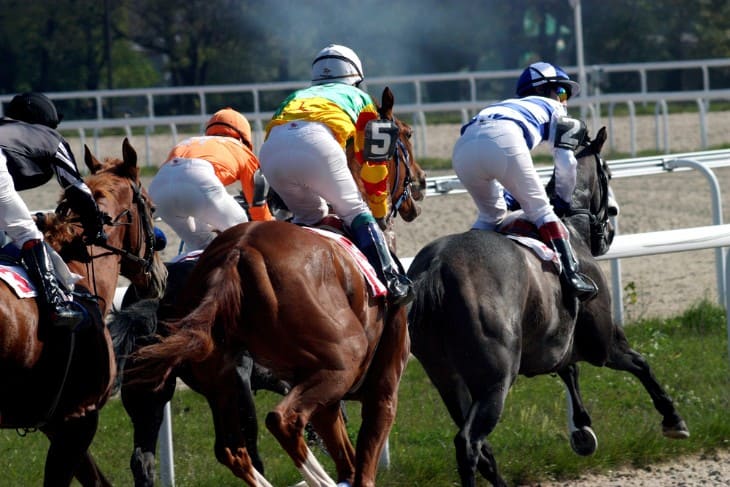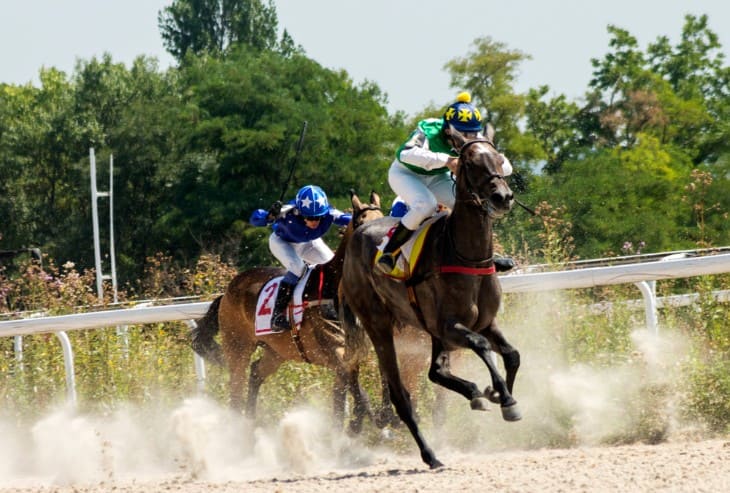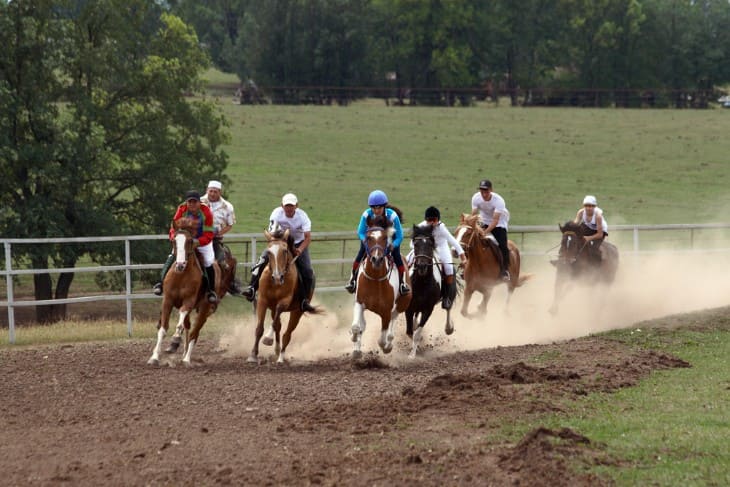Understanding odds is an important phase for complete rookies at the races or those who want to begin betting. Bets and cards can have odds as 9/2 in them, and knowing what these numbers mean adds a lot of depth and thought process to your experience in the event. The article will cover what 9/2 odds mean in horse racing, how to calculate potential gains, why bookmakers use such odds, and how they might influence your betting decisions.
What Actually Does 9/2 Odds Mean in Horse Racing?
When you see a horse's name next to 9/2 odds, it means that it has moderate risk but good potential returns. If the horse wins, you will get £9 for every £2 that you bet. This explains how much money one should expect from the winning bet, as indicated by the bookies. The first number (9) relates to the win, while the second number (2) refers to the total stake required for that win.
It means you're not betting on the race favourite when you wager on a horse at 9/2 odds, but you're also not backing an outsider. This is a capable animal, although it's far from being a certainty on any card. It's a clever selection for gamblers searching for a trade-off between probable victory and a nice return.
To give an example, say you put £10 down on a horse with odds of 9/2 on it coming out tops; calculating your winnings starts with getting to know the fraction. The chances of 9:0 are equal to winning x4.5 times whatever amount is staked; therefore, four points five times ten pounds equals forty-five pounds, which makes up total earnings, including bringing back the initial ten-pound stake resulting in fifty-five pounds.
In horse racing contests like this, understanding these figures helps prudent bettors make bets. How much can be won back, and what does that tell us about chances offered by the bookies? 9/2 odds would be regarded as a good middle ground, often attracting bets from those who want something other than just the favourite and are seeking a larger payout.
How to Calculate Returns from 9/2 Odds
Calculating returns on a bet placed at 9/2 is not in any way complicated. The following ways can help you;
- Understand the Fraction: In this case, if your horse finishes first, you will win £9 for every £2 bet. What the numbers in the fraction mean is that the first number is your winnings while the second one is your stake. To find out how much could be won, understand what ratio the odds represent. When divided by two, nine gives four points five; therefore, 9/2 translates into winning £4.50 for each pound staked.
- Calculate Winnings: To determine your potential gains, multiply your intended wager by 4.5. For instance, if you place a bet of £10 at odds of 9/2 and multiply it by four and one-half, the answer comes to forty-five euros. In other words, if your horse wins, you will take home forty-five euros.
- Add Stake: The total amount returned is calculated by adding together what you initially laid down for betting and any winnings received. In this example again, you would add your original £10 stake to these £ 45 winnings, thus making your overall return, should your horse win, £55.
Calculating your returns is an essential aspect of understanding how much you could earn when you place a bet. A simple way to do this is by multiplying your stake by the ratio (4.5 in this case for 9/2 odds) and adding the original stake, giving you an idea of what you stand to gain. This will help you decide how much to put on it and also help manage your betting budget.

The Importance Of 9/2 Odds
Amongst other things, 9/2 odds tell you many things about the horse as regards its chances in that race; they are very significant in horse racing. These odds mean that the horse has a reasonable chance—it's not the favourite, but it is one of several with a genuine claim on the spoils. That's why some punters may want to go for horses at 9/2 because they feel this way, the risk factor is manageable while it can still lead to big rewards.
Horses with 9/2 odds tend to attract people who want more than just picking favourites. They desire a high return from their bet without too much exposure. Thus, these could indicate that such animals are well-valued, possibly due to good performance in other meetings or favourable track conditions on D-day.
Betting on a horse at 9/2 odds might be thrilling, combining danger with potential reward. Unlike backing favourites, which tend to be entirely predictable, this adds an element of intrigue and an opportunity for higher winnings. It's suitable for individuals yearning for more incredible excitement as far as punting goes but still trying to make sense out of their choice.
All in all, settling on 9/2 is fine; even those who have never tried such wagers before may try them out today since they offer attractive alternatives both for inexperienced and experienced gamblers alike. They provide favourable chances of winning and can make betting a challenging, fun-filled affair. Having such odds in mind helps punters to make well-informed choices that may lead them into better positions at the end of the races.
How Bookmakers Set Odds
Bookmakers consider several factors when setting the odds for a race. They examine how each horse has performed in previous outings, what marks they achieved on similar tracks, and how they have fared against other runners here. Weather conditions on race day and track conditions also matter.
Bookies use this information to assess the chances of every horse winning. They set the prices that correspond to these chances. A horse with good recent form and favourable conditions may be given much shorter odds, indicating that it is more likely than others to win.
Bookies also watch for patterns in gambling activity. To minimise risks, they adjust their odds to ensure an even number of bets on all horses. If everyone bet on one horse and this horse won, the bookmaker would stand to lose a lot of money; as a result, this only encourages gamblers to bet on other horses instead, thus spreading out any chances of losing their investment.
The process of setting odds is about more than just predicting winners. It's also about managing the bookmaker's financial risk. When oddsmakers give an offering like 9/2, they indicate an excellent prospect for victory by this animal but no absolute assurance yet, thus promoting greater diversity in bet placements across multiple outcomes.
Being aware of how bookmakers arrive at their odds could help you make more informed bets. Understanding that this is influenced by a horse's chances and what the public wagers on can give an edge. In addition to understanding who may win, knowing how the market reacts to gambling is essential. This is very important in decision-making when it comes to betting.
Odds Of 9/2 On Betting Strategy
When you come across a horse with odds of 9/2, it significantly impacts how you would go about your betting strategy. These odds indicate that the horse is not an outright favourite or a long shot but a strong contender with prospects of winning. This makes it an exciting prospect for strategic betters.
Selecting a horse with odds of 9/2 can be a wise decision, though, where one is looking to balance risk and reward. Such chances are likely to pay enough but not too much, and this will favour those who do not only want to make maximum returns but also take into account the probability of winning them. It encourages more thoughtful gambling whereby emphasis is placed on value rather than just picking winners.
Again, betting on a horse with odds of 9/2 could help diversify your bets in horse racing. Instead of placing all your bets on low-odds favourites or high-odds underdogs, horses with such odds fall in between. This adds an element of strategy to your betting as you consider whether the potential return outweighs the associated risk.
Therefore, the influence of 9/2 odds upon one's gambling plan must involve careful considerations. Once you know these oddities, it's predicting their possible chance is easier so that you stake what is right accordingly. Thus, this also improves the satisfaction derived from betting and makes it more involving, raising the interest in returns after completing races. Betting guided by strategies considering rates like 9/2 ensures gamers concentrate on their monetary constraints and thrilling moments during race days.

Comparing Odds Of 9/2 With Other Odds
When examining horse racing odds, some range from very low to very high. Comparing these odds ratios gives information about what kind of bets you have available at any given time.
The 1/1 and 2/1 odds are the low odds. For example, these are usually given to horses that are very favourites. Even though you can consider betting on them as safer, your yield after a stake is minimal.
Conversely, higher odds, such as 10/1 or even 20/1, were also provided for horses with a lower probability of winning. The risk of betting on these horses is higher because they will hardly win a race. However, when such an animal succeeds in breaking this spell, then its rewards become huge. On the other hand, it's a much more unpredictable, although exciting, kind of gambling.
The odds of 9/2 occupy the two extremes. They offer a profitable but reasonable reward, just like the favourites, making them preferable to those with greater length but less probability of success, amongst which they fall into place. Thus, many gamblers see potential in 9/2 and prefer to achieve a better balance in their chosen way of gambling.
9/2 odds provide a middle ground in comparison with other types of odds. They are ideal for gamblers who want to avoid the low profits of staking on favourites or the high risks involved in betting for underdogs. This analysis helps you decide where to put your money based on how much you can afford to lose and what type of gains you expect. Therefore, grasping these distinctions is crucial in enhancing horse racing betting strategy.
Tips for Betting with 9/2 Odds
If you choose to bet on a horse with 9/2 odds, here are some practical tips to help you maximise your bet:
- Find out about the Horse: Look into the horse's background before placing your bet. What has it done in past races? How is its form? This information will help you make an informed decision about whether this horse stands a chance. The history and performance of horses may be so influential when making decisions. A well-informed decision has a higher chance of being correct. Also, please note how it behaves under circumstances similar to those expected in this race.
- Consider the Conditions: Check out track conditions, weather patterns and competition levels for that race. Some horses perform better on certain surfaces or in certain weather conditions. Significant differences could result from just a day's variations in weather conditions during horse racing. One horse might perform differently when riding through the mud if it does well on dry fields. Additionally, other horses will determine how far it can go at 9/2 points; hence, consider them all before moving.
- Manage Your Bets: Even if the odds seem good, never stake all your money on one horse; diversify instead for risk management. Consider adding these to other bets and choosing several such horses at 9/2 odd rates. Spreading your bets prevents enormous losses. The more spread out the risk, the higher your chances of gaining something, albeit not a grand prize. This is particularly true when betting on horses with odds like 9/2.
These tips will help you bet better on a horse with odds of 9/2. Every bet involves risks but can be reduced and managed through careful thought and planning. Therefore, betting carefully will increase your chances of winning.
In Summary
These are tempting alternatives for any gambler seeking a balance between jeopardy and remuneration; hence, many people favour them in the gambling market. As such, they indicate a horse with a fair chance of winning; understanding how to read and apply them can significantly improve your betting. However, just like other forms of gambling, being responsible and well-strategized is essential in betting. Learning what precisely 9/2 odd means can be helpful whether at the track or online wagering, which form part of tools for successful gambling.








